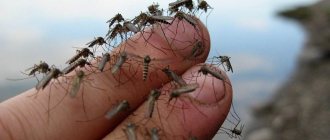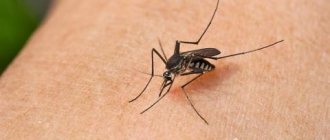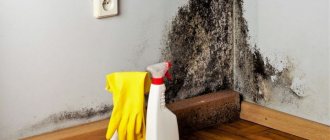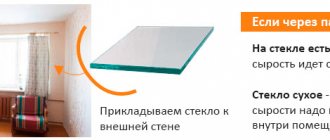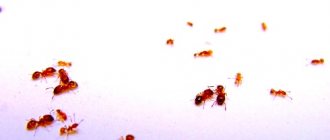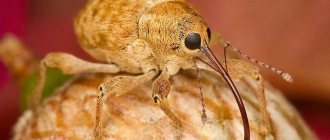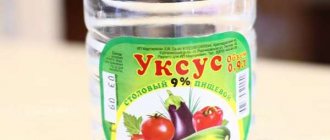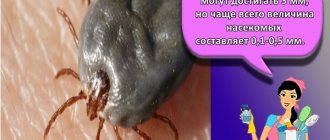Mosquitoes are already so annoying that people are coming up with more and more new ways to get rid of them. Young and not so naturalistic experimenters advise rubbing yourself with herbs, manufacturers are releasing more and more electronic devices. There are so many methods, tips and products that we decided to untangle this Gordian knot and put everything on the shelves.
To competently get rid of mosquitoes, let's find out what modern means can and cannot do, and what functions each of them performs. Here we have collected ALL the methods of getting rid of mosquitoes, invented by humanity over thousands of years: from bacteria that kill larvae to powerful modern propane traps. But first, let's be clear about what does NOT work against mosquitoes.
Is it possible to get rid of mosquitoes using electronic repellers and traps? Unfortunately, electronic repellers have no effect on mosquitoes at all, scientists have proven this 100% long ago. As for bug traps, these bug “electric chairs” do a good job of catching insects, but there are few mosquitoes among them. In the 90s, scientists conducted experiments, several studies, which showed that traps do a very poor job of catching female mosquitoes, which are blood-sucking mosquitoes. Scientists say most of the insects caught in the trap are beneficial insects, such as water bugs, which fish feed on. Therefore, we will not consider electronic “bug traps” as effective ways to get rid of mosquitoes.
So what do we have left? There are only a few methods approved by scientists: repellents, traps, means to get rid of mosquito larvae and insecticides for adult insects. Let's figure out what these products are, how and when to use them.
- Repellents , as you understand, can only scare away. This includes DEET-based sprays, picardine, bracelets, and permethrin-impregnated clothing. (You can read about them in the review of the 14 best repellents )
- Traps . They catch adult individuals, but do not affect the population in any way; mosquitoes have multiplied and will continue to multiply when such devices operate. These include carbon dioxide traps (CO2 traps), heat traps, H2O traps and propane traps.
- Mosquito killers that kill not only adults, but also interrupt the breeding cycle. The first - powerful chemical insecticides - kill adult individuals, the second - special Bti bacteria - fall asleep in water bodies and they destroy the pupae.
In general, get ready, if you have hordes of mosquitoes, then you will have to use all the products together. For personal protection - repellents, on the site - traps, and to reduce the number - chemicals or bacteria that kill mosquitoes in the bud, which means interrupting the breeding cycle. And we will start with them. But first, let’s dispel myths about folk remedies.
Is it possible to get rid of mosquitoes using folk remedies?
Do garlic, vitamin B1 or brewer's yeast repel mosquitoes?
There are many myths floating around the Internet about natural mosquito repellents. One of these misconceptions is that vitamin B1 (thiamine chloride), garlic, brewer's yeast, if eaten, repel mosquitoes. Manufacturers promise that just one tablet will protect you for 24 hours! Tempting, isn't it? But we're sorry to say, scientists at Northern California State University don't believe these "magic pills" are effective and say several studies don't support the notion that these products are effective repellents against mosquitoes, other blood-sucking insects and ticks.
Basil
Fast-growing basil leaves are as mosquito repellent as they are a tasty addition to our pesto and salads. Not all types of basil are created equal when it comes to repelling mosquitoes, and the extra-spicy Thai basil, with its narrow foliage and cinnamon scent, has the best insect repellent ability. All basil plants require sun and warm temperatures, making them excellent companions to tomatoes.
Photography – instagram
How to get rid of mosquitoes in your summer cottage
Mosquito larvae can be killed using both biological and chemical means. Since mosquitoes lay larvae in water, and you have standing water on your property (pond, rainwater storage tanks), we will add special live bacteria there. You should start filling them early, from the beginning of April, and continue until the end of summer. Scientists at the University of New Jersey recommend using bacteria containing Bacillus thuringiensis (BTI) to kill the digestive systems of mosquito larvae.
Anti-mosquito bacteria in tablets and granules
These are three identical products, with the same active ingredient - Bacillus thuringiensis subspecies israelensis (BT.I.). This is a biological regulator of the mosquito population. The products differ only in shape: round tablets resembling donuts, granules and bags with crushed drug. The first two products are the best selling products for getting rid of insects on the American Amazon and are time-tested: 90% positive reviews (4.6 out of 5 stars) and more than ten years of experience in the anti-mosquito products market speak for themselves
Mosquito control products kill the larvae and prevent them from reappearing for 30 days. This method is 100% natural, organic and environmentally friendly. You can place the product in a pond, birdbath, flower pot, storm drain, rainwater collection pond, barrel under a drain, drainage, just a deep puddle - or in any body of standing water, even tree stumps and roof drains, etc. etc. But this is not enough - in order for BTI bacteria to work best, you need to remember several important conditions:
- use such a biological regulator in the evening or closer to night - scientists believe that direct sunlight destroys bacteria;
- The bacteria have a narrow spectrum of action and will only help in the fight against mosquito larvae, black flies and fungus gnats (sciarids).
Let's look at the effect of live bacteria on mosquitoes using Mosquito Bits as an example. Manufacturers claim that all existing mosquito larvae will be killed within 24 hours before they grow into full-fledged mosquitoes, which means they will never hatch. In practice, destruction often occurs much faster: here is one review of Mosquito Bits: “My son and I tested the product by taking a 20-liter bucket full of live mosquito larvae. We put in maybe half a teaspoon of granules and all the larvae were dead within three hours.” By the way, the manufacturer does not indicate how often the portions of granules need to be renewed, but scientists advise doing this regularly, once every 7-12 days, following the dosage instructions of 1 tsp/2.3 sq.m. water surface.
Experience shows that the bacteria are truly safe for pets and wild animals, many users allow their dogs to drink water from ponds treated with bacteria, and the active ingredients do not affect the health of rabbits, squirrels and other animals living nearby.
Many users consider bacteria to be a 2-in-1 tool: it can be used both as an express means to kill larvae and for prevention. As a preventive measure, bacteria begin to be used on large sources of standing water even before the onset of mosquito season, namely in April. Mosquito Dunks & Bits Price: From $5.80
Best Chemical Growth Regulators to Kill Mosquito Larvae
An alternative to bacteria is Insect Growth Regulators (IGR) . Among the safe IGRs that experts from the California Department of Public Health advise to use is methoprene. Scientists say that, like Bti, methoprene is safe for people even if it gets into drinking water.
On the American Amazon you can find several products containing methoprene. One such product is Altosid Pro-G Mosquito Larvicide. This is not a concentrated IGR solution, like other similar products, but granules. As the manufacturer promises, they “prevent the appearance of mosquitoes, stopping their reproduction even before adult biting individuals emerge.” The package for $34.24 contains 1.2 kg of granules, which will cover up to 500 sq.m. Even if you use them sparingly, the effect is visible within 24 hours. Even users in Florida's "mosquito kingdom" praise its effectiveness (“just remember to spray it monthly and don't forget about your gutters!”)
There is another powerful IGR based on pyriproxyfen (also known as Nilar), which is used in Africa to control mosquitoes that carry dengue fever and malaria. It's also sold on Amazon, but we don't think you'll need such a strong chemical. Although it is approved by scientists for use in drinking water, it is more toxic. Pyriproxyfen is almost 40 times more potent than methoprene against some types of mosquitoes. This concentrated liquid must be diluted at the rate of 30 g per 4.5-5 liters. – ultimately 1.8 kg. enough for about 560 sq.m. Worth from $17.18
Remember: mosquito larvae can be found anywhere, they don’t necessarily need a pond or swimming pool to do so! “Any standing water, even a small puddle, can serve to support a population,” says Jack D'Angelis, an entomologist at Oregon State University. He advises, “Make sure gutters are properly drained and flower pots and gutters are empty.”
Thyme
Thyme rounds out the list of zesty herbs that repel mosquitoes, making you wonder if homemade soup might be the best remedy for all those pests. Plant thyme between rocks in your garden, where the rocks will crush the leaves and release mosquito-repellent oil.
Photography – instagram
Follow us on Pinterest for more interesting articles.
Useful short videos from Make-Self.net
How to Get Rid of Mosquitoes in Your Yard: Killing Adult Mosquitoes with Insecticides
Now that we have “dealt with” the larvae, we begin to fight the adults. First, let's look at insecticides.
As a means to kill adult individuals, experts from California recommend using: organophosphates (malathions) - pyrethrin, pyrethroids (deltamethrin, permethrin, sumithrin). Among the products that are for sale on the American Amazon, we have selected several insecticides with such active ingredients. Not only do they kill mosquitoes, but they also create a barrier around your property. The first product is suitable for manual treatment by spraying, and the second is used as an anti-mosquito smoker.
Suspend Sc Insecticide
Powerful insecticide for indoor and outdoor use. Its active ingredient is deltamethrin from the group of perethroids. Produced by the global giant Bayer and considered a professional insecticide. This is a multifunctional product - it works against 50 types of pests. Different pests require different dosages; read the label or the manufacturer’s website. In general, users are satisfied with the insecticide, but opinions about the insecticidal barrier against different pests vary. While “owners” of other insect pests note that the residual effect of the product lasts up to a month, those fighting mosquitoes say that the respite occurs only for a few days. Although a few days of quiet life is already good! Price from $41.40
Black Flag 190255 Fogging Insecticide 32-Ounce
For outdoor use only – for treating large areas! Active ingredient: 3-phenoxybenzyl is a strong insecticide - permethrin (from the group of pyrethroids). Kills mosquitoes and midges, creates a barrier lasting up to 6 hours. Be sure to use a protective mask and carry out processing only in calm weather! Price ~$14.93.
Be careful, scientists say that mosquitoes eventually become resistant to the pesticides that were used to poison them in the past. Most likely, you will never know what chemical your neighbors or previous owners of the house treated their areas with, so if some product does not work, do not immediately rush to say that it is ineffective, perhaps it is a matter of addiction.
Lavender
It's a fact that mosquitoes don't like the smell, and the pleasant aroma of lavender means you can apply the plants to your skin as a kind of natural repellent : chop the plant finely and mix with sweet almond oil. As a last resort, simply crush the flower and apply to your skin and clothing.
Photography – instagram
How to get rid of mosquitoes in the yard: fumigators and traps
We talked about insecticides, chose the best ones, now let's decide how to use them correctly. The most effective method of spraying is to use foggers. Foggers (hot fog generators (fumigators)) can be called “weapons of mass destruction.” Creating toxic fog is a simple and effective method of mosquito control.
The Burgess 1443 40-Ounce Outdoor Propane Insect Fogger is one of the best-selling foggers on Amazon with a rating of 4.4 out of 5 stars. Why is it so popular? Obviously because of the price. Before writing a review, we made sure that you can save your money with it: it’s not exactly the best, but it’s a solid and cheap device. It is powerful enough to release mist up to 3m away. Price: $61.77
Mosquito traps
If you don't want to deal with steam generators and insecticides, try traps. There are different types of mosquito traps: propane, carbon dioxide (CO2) and water (H2O). Previously, we devoted a full-scale review to all types of traps, and here we will briefly talk about all of them. So, there are 4 types of highly effective traps.
Heat traps heat the air above average temperature and thus attract mosquitoes. Their main advantage is their coverage area (up to 2 hectares), and the main disadvantage is the premium price and large size. This is a good choice for industrial enterprises and farmers.
A water trap (H2O trap) is suitable for those who suffer from allergies, and it doesn’t cost too much. It is hypoallergenic, does not require any attractants and can function both at home and at work. Their efficiency, however, is lower than that of propane-based traps.
Carbon dioxide traps (CO2 traps) are a cross between compact home traps and giant propane ones. They emit carbon dioxide and thereby attract mosquitoes. Some models can even function without gas cylinders, as carbon dioxide is released from the metal using photocatalysis.
Propane traps are the most effective and most expensive traps. They can deal with any mosquito, they kill thousands at once and therefore significantly reduce the mosquito population. They work 24/7. The idea behind propane traps is that they convert propane into carbon dioxide, heat and moisture. When mosquitoes fly, they are pulled into a trap (like a vacuum cleaner). Within 24 hours the insects will die from dehydration and all you have to do is empty the tray.
Dill (Fennel)
Dill serves many beneficial functions in addition to its mosquito repellent properties: the fuzzy plants are as ornamental as any tall garden herb, the leaves are delicious in salads and soups, and attract butterflies in the garden.
Photography – instagram
How to get rid of mosquitoes in the house
So, we talked about how to kill larvae and get rid of adult mosquitoes on the street. The main thing is to secure the perimeter so that not a single creature can fly into your home! Now let's fight those who managed to get inside.
And here we will disappoint you. All scientists unanimously say that no single effective mosquito repellent product has yet been invented for use at home. And you and I will have to kill the bloodsuckers that fly into the room the old fashioned way: with a vacuum cleaner or newspapers.
Here they are, the five best ways to get rid of mosquitoes in your home, as recommended by entomologists.
Get rid of any standing water in your home . Scientists say that mosquitoes can lay eggs even in water in a saucer from under a flower pot! And a long-forgotten vase of water from under flowers can serve as a huge breeding ground for mosquitoes, not to mention in damp basements! Eliminate all such sources, and then begin to fight the remaining mosquitoes.
Use a vacuum cleaner . We are sure that the idea of picking up a vacuum cleaner and chasing bloodsuckers in the style of “Ghostbusters” has already occurred to you. Well, it's time to make some noise! Don't forget about the ceiling, walls and places behind the curtains - mosquitoes can hide there.
Electric fly swatter: just press a button.
This is a very popular product: in the top twenty bestsellers on the American Amazon there are as many as 9 fly swatters from different manufacturers.
The Executioner Fly Swat Wasp Bug Mosquito Swatter Zapper .
This $19.99 electric fly swatter is in the top three best electric fly swatters. It requires two AA batteries to use and looks like a tennis racket. The device is made of ultra-light plastic and weighs less than 340 grams. The idea is simple: any small insects found in the “working area” of this device will feel like they are in the electric chair (if you press a special button, of course). One blow kills a dozen mosquitoes. It's even interesting. However, you will have to use the racket many times in order to kill all the mosquitoes. On the other hand, this device does not use any attractants, aerosols or other chemical compounds. Its electric discharge is safe for humans. Use mosquito nets to protect your home and children from mosquitoes
Mosquito nets have long been used only for windows. Progress has also been made in this area. This screen combines insect repellent Velcro and special magnets. This is a very popular product - the number one seller of window mosquito control with over 5,000 reviews. Judging by the Amazon rating (4.5 out of 5 stars), customers love this device. They claim that this screen will take less than half an hour to install with a video tutorial and can be used all summer long. The negative reviews we found were that one customer's dog liked to chew on this screen, and another customer had this screen that would not go into place without additional installation. Price ~$29.95
The Jumbo Bed Mosquito Net, King Size, can protect the largest bed from mosquitoes. It costs ~$4.99 and looks pretty good. Obviously, you won't be able to hang a canopy like this over your bed if you live in an apartment, but if you live in a rural area or are traveling south, this device will do the job.
There are also mosquito nets for baby strollers. These nets cost from $4.66 and can completely protect your baby from mosquitoes and bad weather, without any extra effort. It sells well and is rated 4.5 out of 5 stars by customers.
Use fans . Scientists from the University of Georgia also recommend using fans to keep mosquitoes away - but be careful with this method, it's easy to get sick, even in the summer!
That's probably all that scientists approve of. Not much, right? Remember at the very beginning we talked about another method? It is very controversial because scientists do not believe in the effectiveness of the electric fly swatter. On the other hand, in the absence of another way to kill mosquitoes in the house, many buyers are satisfied and say that they help kill mosquitoes in the house, but also all flying insects in general.
Eucalyptus (Eucalyptus)
Eucalyptus can grow up to 20 meters in height in just a few years. Because it is a delicate plant that will not survive frost, the best alternative for many gardeners is to grow eucalyptus in a container. For short-term growing, choose the fast-growing species E. globulus bicostata , which will give you plenty of aromatic leaves for harvesting and repelling mosquitoes. For a plant that will live for several years in a pot, choose a slow-growing eucalyptus such as E. vernicosa. Eucalyptus plants love sun and rich soil.
Photography – instagram
Seven proven and successful ways to get rid of mosquitoes, approved by scientists
So, let's summarize our investigation and list all 7 methods that will definitely help you get rid of mosquitoes. We will start with the simplest ones and end with the “heavy artillery”, the means used by professionals.
- Mosquito nets are usually easy to use and cheap. Use them as an ongoing preventative measure to protect windows and doorways, and also cover beds (babies too) and prams when out and about.
- Homemade and natural repellents are your choice if you prefer everything natural and organic. Some plants and oils repel mosquitoes - find the ones that work best for you in our Best Anti-Mosquito Herbal Repellents review.
- Ready-to-use repellents not only repel mosquitoes with a strong odor, like plants, but also “mask” the carbon dioxide (CO2) we exhale and other human body odors that are attractive to mosquitoes. These also include concentrated liquid repellents that need to be sprayed over large areas. The most effective repellents are those based on DEET, Picaridin, oil of lemon eucalyptus (OLE), IR3535 and permethrin.
- Bacteria to destroy larvae . This is a very important point in the fight against mosquitoes. Use these larval control products to interrupt the larval stage of mosquitoes in standing water. There are larvicides based on both live bacteria and chemical ingredients such as methoprene.
- Adult Killers – These concentrated liquid insecticides are designed to kill adult mosquitoes. Dilute the product according to the instructions - and go ahead, spray the area!
- Mosquito traps are powerful devices that attract insects with light (UV traps), CO2, heat and moisture (H2O traps). Once trapped mosquitoes are trapped in a confined space, they die from dehydration. The traps are safe for people. The trap will protect you from several dozen mosquitoes at home, while propane traps will exterminate thousands of mosquitoes outdoors.
- Foggers (steam generators) are devices that create a toxic mist of insecticides that kill mosquitoes.
Additional information on the topic: Review of the best mosquito traps.
Lemongrass
Natural lemongrass oils manage to smell like real lemons, only better. Lemongrass is a staple in Asian cuisine, and its subtle aroma also lends citrus notes to some perfumes. This delicate plant will not survive the winter, so when the warm season ends, the container with lemon grass is returned to the room. Even if the plant grew in open ground, if desired, it can easily be transplanted into a pot. Chop the leaves of this plant and sprinkle them around your deck at your next feast, both to repel mosquitoes and add a pleasant aroma.
Photography – instagram
How to get rid of mosquitoes in nature and in the forest
Do clothes with anti-mosquito treatment work?
Repellent-impregnated clothing is not some newfangled invention. Military uniforms treated with permethrin have long been tested on the military, saving American soldiers from malaria and other diseases caused by insects, some of which were fatal. The US Army has used permethrin for more than 20 years to impregnate uniforms. And only recently have they begun to use this technology for commercial purposes and produce clothing for civilians.
What to choose: clothes with anti-mosquito impregnation or spray?
You can buy ready-made clothes treated with permethrin or buy a spray, for example, from the American brand Sawyer and treat your clothes yourself. Factory impregnation of clothing against insects can withstand from 25 to 70 washes, but under no circumstances should it be dry cleaned. And you can’t iron it either, because, as scientists who conducted experiments say, ironing destroys the components of permethrin. The main advantage of the spray is its low price - $13 for a 350 ml bottle of spray, but the effect of one treatment lasts up to 40 days or 6 washes.
Theoretically, clothing can be treated with other repellents, for example those containing DEET, but they are less durable and do not retain the repellent effect after washing.
Are permethrin-treated clothing safe?
The U.S. Environmental Protection Agency (EPA) has certified the safety of clothing treated with permethrin. In 2009, they assessed the risks in various modes of use, including wearing the clothes by toddlers, or contaminated clothing, or, in the case of the military, long-term daily wear. And they concluded that clothing impregnated with permethrin in factory conditions is unlikely to pose any threat to the people wearing it, both in the short term and during long-term wear. They also claim that there is no risk for pregnant and breastfeeding mothers. Although, you can certainly weigh all the dangers and consequences yourself by critically approaching the issue. Yes, permethrin is a powerful pesticide. Therefore, it is hardly worth spraying all your clothes and children’s clothes in the city. But, if you or your child are traveling to a forest infested with ticks and mosquitoes, then the benefits of using permethrin outweigh all the risks.
We have prepared a table for you showing the active ingredients effective against mosquitoes, repellents, and where they are used.
| Active Ingredient | Product | Photo | Price |
| DEET | Repel 100 Insect Repellent Spray – kills mosquitoes, ticks and other biting insects for up to 10 hours | ~$6.96 | |
| Picaridin | Sawyer Repellent with 20% Picaridin – spray provides up to 12 hours of protection against mosquitoes | ~$6.90 | |
| Avon SKIN SO SOFT with 20% Picaridin – spray for gentle protection of the whole family | ~$10.95 | ||
| Permethrin | Black Flag Fogging Insecticide – used for fumigation of large areas with steam generators | ~$14.93 | |
| Permitrin -Treated Insect Shield Tee Shirt | ~$27.95 | ||
| Sawyer Permethrin Clothing Insect Repellent - a special spray for spraying clothes | ~$13.00 | ||
| IR3535 | Avon SKIN-SO-SOFT IR3535 – moisturizing mosquito repellent lotion with sun protection | ~$4.79 | |
| Pyrethroids | Cutter Backyard Bug Control is an insecticide for protecting large areas. Connects to a hose. | ~$9.45 | |
| Eucalyptus oil | Repel Lemon Eucalyptus Natural Insect Repellent Spray – provides 6 hours of mosquito protection | ~$8.99 | |
| Citronella oil | iCooker Mosquito Repellent Bracelets – natural repellent bracelet | ~$19.99 | |
| Cutter Candle – repellent candles for natural protection against mosquitoes | ~$14.77 | ||
| Citronella Outdoor Sticks (set) – the smoke from lighting these sticks repels mosquitoes | ~$17 | ||
| Geranium oil | Invisaband All Natural Mosquito Repellent Bracelets - safe mosquito repellent bracelet, suitable even for children | ~$19.80 |
Anti-mosquito insecticides: for larvae and adults
| Type | Product | Active substance | Price on American Amazon |
| Biological agents (bacteria) for larvae Place in standing water | Mosquito Dunks | BTI | ~$5.80 |
| Mosquito Bits | BTI | ~$16.76 | |
| Bonide Mosquito Beater Water Soluble Pouches | BTI | ~$7 | |
| Grub chemicals (IGR) Pour granules/diluted concentrate into standing water | Altosid Pro-G Mosquito Larvicide | Methoprene (Precon) | ~$34.24 |
| IG Regulator, 4 oz by Martin | pyriproxyfen (Nylar) | ~$17.18 | |
| For adults Spray the area | Suspend Sc Insecticide | deltamethrin | ~$41.40 |
| Black Flag 190255 Fogging Insecticide | permethrin | ~$14.93 |
Ageratum
Light-loving ageratum belongs to that rare category of plants that can bloom almost all summer, the main thing is to choose the appropriate place for it on the site. The color of the flowers varies from white and pale pink to blue and deep purple, i.e. you can easily fit this plant into any flower bed.
Ageratum loves light and well-drained soils and does not tolerate waterlogging. To achieve abundant and long flowering, it is best to plant ageratum in well-lit areas. Please note that this crop should be fed with great care, since too high a nitrogen content in the soil causes the ageratum to begin to grow green mass to the detriment of flowering.
- Ageratum - all about planting, care and popular varieties
We tell you how to grow beautiful ageratum on your own plot.
Varieties
Entomologists count more than 3,000 species of mosquitoes and classify them into several large groups:
- Common (squeaker) . The most common type. An adult specimen measures 3-8 mm. Bloodsuckers include female squeakers - they require blood components to breed offspring. And males feed on plant juices. Squeakers are carriers of serious diseases such as eczema and meningitis.
- Centipede (karamora) . They live in areas of high humidity, near water bodies and swamps. Individuals are large in size - about 4-8 cm in length. Karamors are safe for humans, but they cause great harm to garden plants. Centipede larvae actively eat tender plant roots and destroy young seedlings.
. Carriers of dangerous malarial plasmodia - the causative agents of malaria. In appearance, Anopheles is similar to ordinary mosquitoes, the difference being the increased size of the hind legs. They live in areas located near water bodies.
Malarials (Anopheles)- Two-lined biter . A small insect, common in almost all climatic zones. The main difference is the bright white stripes on the limbs and body. Individuals are carriers of deadly infections.
- Winter (chionei) . They are slightly similar to long-legged mosquitoes and have a length of 10-12 mm. They can be encountered all year round, even during the cold winter months. Their habitats are damp caves, half-rotten trees, rotten stumps, etc.
- Bolotnitsa (meadow) . These insects are not “bloodsuckers”; they feed only on plant juices and nectar. Meadowworts live in mossy forests, water meadows, and swampy areas.
- Dergun (bell) . Insects that are harmless to humans live only 3-5 days in reed thickets near ponds and shallow rivers and swamps. They are distinguished by their greenish-yellow color and elongated limbs. The main food is plant components.
Mosquitoes are the oldest inhabitants of our planet.
They live on it for more than 150 million years. The growth of the population of parasitic insects is facilitated by the abundance of places attractive for reproduction. Mosquitoes actively breed in stagnant, sun-warmed water, rich in organic matter. Any small garden pond, irrigation barrel, or even a rusty tin can with rainwater becomes an excellent place for the parasite to accumulate.
Lemon catnip
bashny.net
Lemon catnip, more often called catnip, looks similar to lemon balm. Cats really love this herb and react to its aroma with a loud purr. Mosquitoes have a different opinion about this plant.
Catnip repels mosquitoes better than DEET. At the same time, the grass, unlike repellents, does not cause any complaints from environmentalists.
Other properties:
- has a calming effect on a person;
- used in cat training;
- improves digestion.
Garlic
nafazendu.ru
Mosquitoes don’t care how much garlic you eat. Bad breath is not a problem for insects. But green shoots of garlic in a flower bed will repel mosquitoes away from the gazebo.
Additional properties:
- has antibacterial properties;
- garlic juice is a natural glue;
- stimulates hair growth when rubbed into the scalp.
Harm to cultivated plants
Mosquitoes are also destructive to garden plants. Particularly harmful are centipedes, meadows and jerks. After all, the main food of such species is plant juices and fragile roots of young plants. Both adult mosquitoes and mosquito larvae cause enormous damage to the crop.
They pose the greatest danger to the following crops:
- cereals;
- berry;
- legumes;
- tuberous;
- root vegetables
Expert opinion
Mityuk Stefania Bogdanovna
Owners of cultivated pastures located near water bodies are experiencing extensive damage. Much attention must be paid to crops grown under conditions of high humidity.
Insecticides
Manufacturers of drugs to combat various pests are trying to improve and release new products every year. For example, insecticides.
The main active ingredients in such preparations are usually fenthion, malathion, deltamethrin, cypermethrin. However, they have many limitations in use due to their chemical composition. Thus, insecticides should not be used on water bodies containing fish for food. It is also not allowed to graze livestock, collect berries, mushrooms and other crops in areas that have been treated with drugs earlier than 20 days after the day of treatment.
To radically solve the problem, you can use insecticides - such products will get rid of mosquitoes for a long time, but they can be dangerous to humans
Important! The advantage of such preparations is the fact that they act as a prophylactic agent, preventing the appearance of many insects, including mosquitoes, in the treated area.
All currently existing drugs do their job well, depending on the conditions of their use. Therefore, if you are wondering which drug to choose in order to protect yourself and your loved ones, then focus on the price and choose a product according to your finances. Domestic products certainly have a more reasonable price than foreign ones.
It’s also worth first determining what causes mosquitoes to appear on your property. For example, there is a pond next to your dacha. In this case, it will serve as a comfortable area for bloodsuckers to live and reproduce. To get rid of or at least reduce the number of annoying insects, it is best to treat the pond with insecticides.
You can treat a pond located nearby with insecticides - this should help reduce the number of insects in the area
